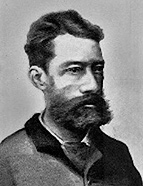

He was the only son of five children in a wealthy family from Guimarães, but without any ancient pedigree, although at the age of 21 he received a letter granting him the coat of arms of a Moço Fidalgo da Casa Real (Young Nobleman of the Royal House). His father, Francisco J. de Gouveia Morais Sarmento, had been an ensign in the militia in Braga and had married Joaquina Cândida de Araújo Martins, who was proud to be the aunt of a figure of some importance in national politics, who would become the 1st Count of Margaride. Among their various properties, the couple owned Casa da Ponte, in S. Salvador de Briteiros , where the family lived and where the castle of the same name is located, which would play such an important role in Martins Sarmento’s scientific career. His education began at the age of eight with primary school in Guimarães and continued at the Colégio da Lapa in Porto, ending in Coimbra, where he completed his preparatory studies, which allowed him to enter university at an early age. It seems that his life as a university student was not immune to the famous bohemian lifestyle of Coimbra and the ultra-romantic poetic adventures so typical of his generation. Despite this, at the age of twenty he had a bachelor’s degree in law. However, his personal life had little to do with his academic training, as he never practised law, living off the income from his substantial estate, in the company of one of his sisters. His late marriage (at the age of 43) to Maria de Freitas Aguiar further improved his financial situation, enabling him to support the considerable costs of his literary and scientific interests, particularly those involved in archaeological research. Émile Cartailhac (Les âges pré-historiques 1886, p. 272) said of him: “In the north of Portugal, in Guimarães, there is an educated and wealthy man, enthusiastic and generous, who has devoted himself to the history of his country.”
This work is financed by national funds through FCT - Foundation for Science and Technology, I.P, in the scope of the projects UIDB/04311/2020 and UIDP/04311/2020.
